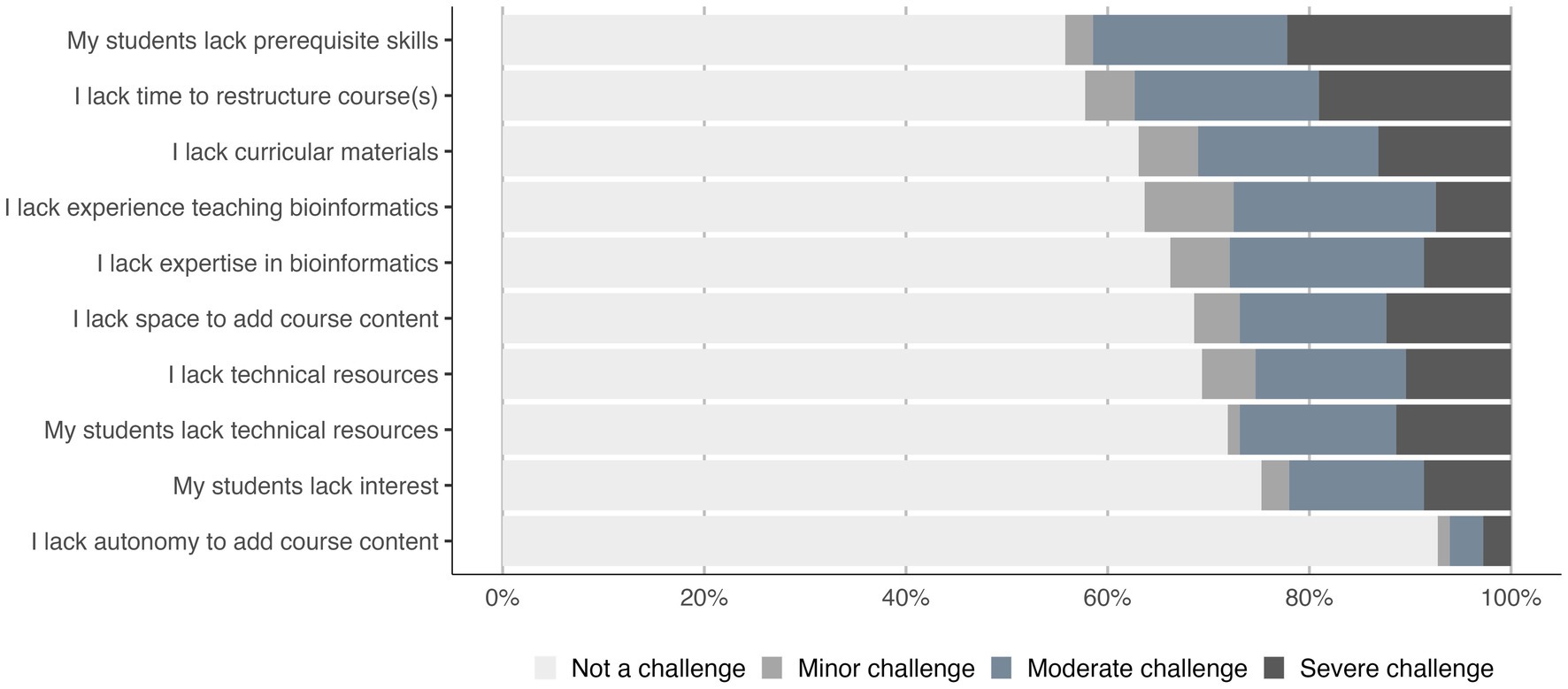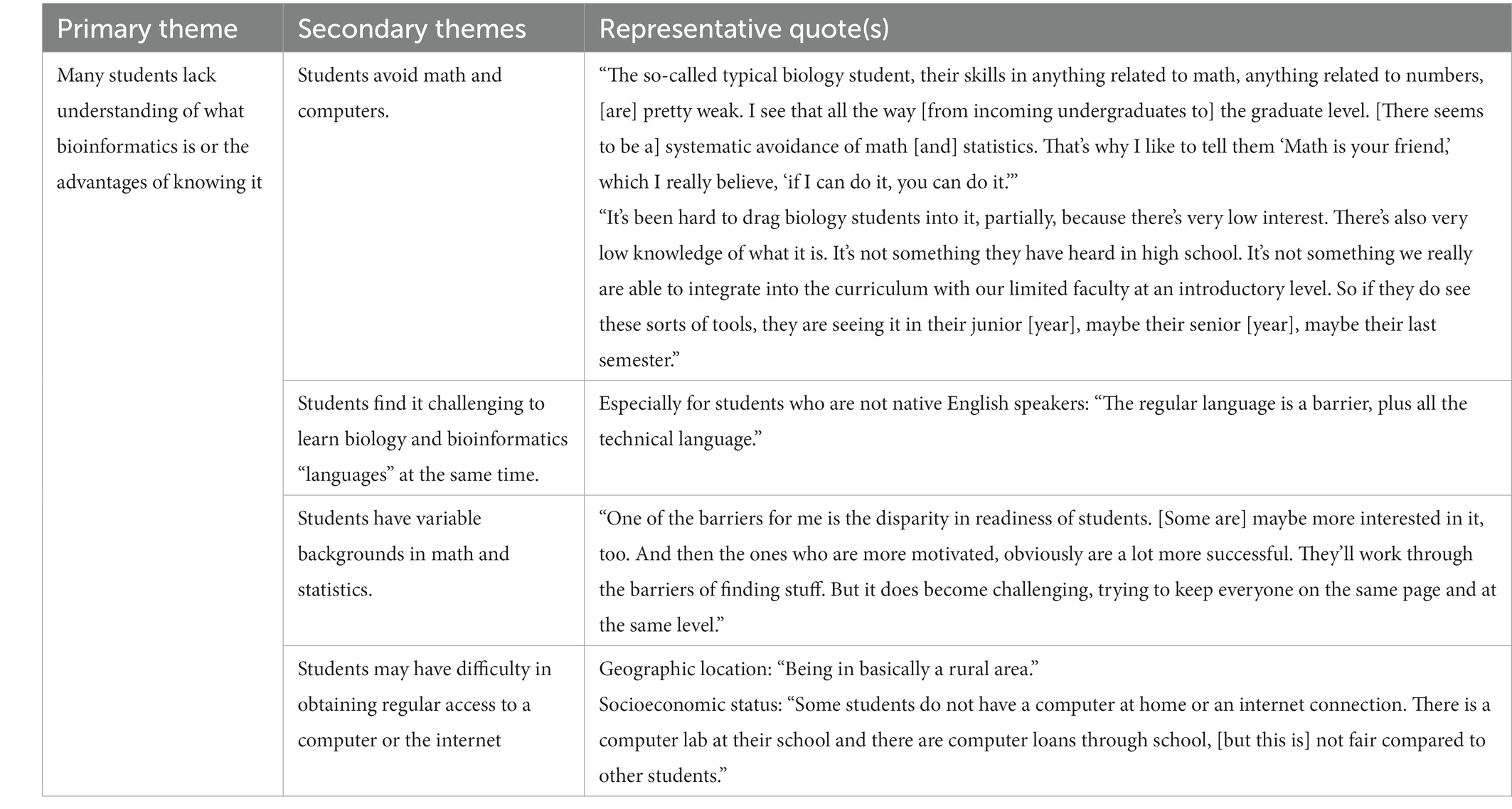Some Ideas on Bioinformatics Tutor You Need To Know
Some Ideas on Bioinformatics Tutor You Need To Know
Blog Article
Top Guidelines Of Bioinformatics Tutor
Table of ContentsThe Ultimate Guide To Bioinformatics TutorThe 25-Second Trick For Bioinformatics TutorSome Ideas on Bioinformatics Tutor You Need To KnowBioinformatics Tutor Fundamentals ExplainedBioinformatics Tutor - Questions
Of the total amount individuals entailed in the training, 80% were pupils from public college establishments, while the staying 20% originated from private establishments. To qualify for a certification of engagement, trainees were needed to participate in at the very least 90% of the complete training hours. As an outcome of this demand, an outstanding 95% of the individuals effectively acquired their certificates, having not only satisfied the minimum presence criteria yet likewise completed all assigned tasks throughout the training.
Throughout the elevation of the COVID-19 pandemic, specifically in between June and August 2020, the project team was entrusted with organizing specialized training in bioinformatics. This training was especially targeted at pupils from the research group Nucleus for Research in Applied Computer at the Federal College of Pará (UFRA) The adaptation to remote learning systems because of the pandemic created a chance to discover new training approaches and electronic tools that improved both reach and performance.
To reply to the growing need in the computing and life scientific researches fields, an advanced training course was introduced in 2020 labelled Introduction to Equipment Discovering. This course was developed to give an obtainable yet extensive summary of Expert system methods, especially as used in bioinformatics. The program was executed over 3 months, from October to December 2020, and was provided entirely online via the Google Meet platform. This virtual format enabled engagement from students across Brazil, much of whom may not have had the chance to attend in-person sessions.
Bioinformatics Tutor Fundamentals Explained
About 50% of the complete training hours were committed to practical tasks where students constructed smart models and applications in a range of clinical domains, consisting of genes, molecular biology, and environmental information analysis. These systems made it possible for students to engage in real-time information manipulation, design training, and algorithm trial and error.
Sixty of them were connected with various higher education and learning organizations in the state of Pará, while the staying twenty came from establishments situated in five other Brazilian states. By presenting Artificial Intelligence in a sensible and pertinent context, the campaign served to bridge the void in between theory and real-world application, giving trainees with a solid structure for future research study or work in the field.
The training initiative formed component of a more comprehensive scholastic outreach effort referred to as the Bioinformatics on the Road project. This task has, throughout the years, introduced loads of trainees to the world of bioinformatics and computational biology. The events held under this umbrella campaign have occurred throughout several areas and years, as summarized in Table 1 (Listing of occasions, locations, years, and overall numbers of trainees and trainers)
Among the most exceptional results of the Bioinformatics when driving effort has actually been its payment to the growth of decentralized research study groups. Numerous of these groups, at first brought with each other by their involvement in training occasions, have since gone on to generate independent clinical research in partnership with neighborhood scholastic organizations. The training not only promoted clinical reasoning within the context of bioinformatics yet likewise triggered collaborative partnerships that expanded beyond the training environment. These collaborations have led to boosted regional clinical performance and added meaningfully to the advancement of the more comprehensive bioinformatics area in Brazil.
Everything about Bioinformatics Tutor
The project itself was conceptualized and arranged by MB and RR, that oversaw the preparation and application of each action. Lectures were provided by try these out a multidisciplinary team including megabytes, FA, EF, KP, JS, DM, SN, LP, LG, IH, air conditioner, and rr. The very same group, excluding IH and RR, additionally acted as tutors for the functional training components. Funding for the project was supplied via the give 88887.200562/ 2018-00 from CAPES. The writers expand their gratefulness to everybody that added to the understanding of this task, whether directly or indirectly, considering that its beginning.
The Federal University of Pará's Office of Research (PROPESP/UFPA) additionally supplied financial backing, particularly for the manufacturing of the last manuscript. The writers state no commercial or monetary problems of interest that can have affected the research. In addition, all viewpoints and interpretations shared in this post are exclusively those of the authors and do not always mirror those of their respective organizations, the publisher, editors, or reviewers associated with the magazine process.

The Best Guide To Bioinformatics Tutor
From an instructional viewpoint, the training approach made use of in the training was deliberately interactive. Classes were carried out in a fashion that urged trainee participation and conversation, going past rote memorization to discover just how concepts are created, applied in daily life, and evaluated in scholastic settings. The training approach concentrated on nurturing both solid and having a hard time trainees, giving individualized support, and building confidence through sustained mentorship and perseverance.

Each group, consisting of roughly 36 individuals, was supported by 3 advisors-- the majority of whom were postdoctoral scientists with specialized proficiency. These coaches not only helped create the group projects but my explanation also facilitated their execution, ensuring that each study question was both appropriate and suitably challenging. The goal was to supply a naturally realistic context that individuals might check out through open-ended purposes and access to curated datasets.
For extra understandings right into the technique and results of this project-based discovering method, visitors are routed to S1 Text, which consists of detailed descriptions of the pedagogical structure, evaluation methods, and job themes utilized in the training sessions.
Getting My Bioinformatics Tutor To Work
Of the total amount individuals entailed in the training, 80% were trainees from public higher education and learning institutions, while the remaining 20% came from personal organizations. To certify for a certificate of involvement, pupils were needed to participate in at the very least 90% of the complete training hours. Especially, beyond the trainees that signed up in the training sessions, 7 skilled teachers took part in delivering the training courses, while three committed research teachers worked with the total training process. About 50% of the total training hours were dedicated to practical tasks where trainees constructed intelligent designs and applications in an array of scientific domains, consisting of genetics, molecular biology, and environmental information analysis. The training not click only cultivated scientific thinking within the context of bioinformatics however additionally stimulated collaborative partnerships that expanded past the training environment.
Report this page